Thanks for your support! If you make a purchase using our links in this article, we may make a commission. And, as an Amazon Associate, I earn from qualifying purchases. See the full disclosure here.
RV beginner mistakes happen when you join the RV lifestyle. No matter how much you prepare, once you turn on the ignition or hitch up, your whole world can feel like it just turned sideways. To help you get through your first trip, we’ve collected the 35 biggest RV beginner mistakes to avoid.
Just remember that we all make mistakes so don’t be too hard on yourself. And don’t be afraid to make some RV beginner mistakes. Almost every time I have to learn something new about RVing I start out at the beginner level, screw it up somehow, and eventually learn from my mistakes.
Just remember that RVing is about relaxing and having fun. Just take the RV beginner mistakes in stride and move on. You will be a pro in no time!
35 of the Biggest RV Beginner Mistakes to Avoid!
1. Not Buying the Right Gear the First Time
You would think this is a no-brainer, but as you’re picking up hoses, cords, and other equipment, it starts to add up even if you buy those RV accessories via Amazon. Talk to an accountant; spending money on a quality item saves you money in the long run because you’re not repurchasing replacements down the road.
Check out our Gear Page to see all the gear we use. We only recommend products that have withstood the test of time.
2. How Do You Get To The Campground? Practice, Practice, Practice
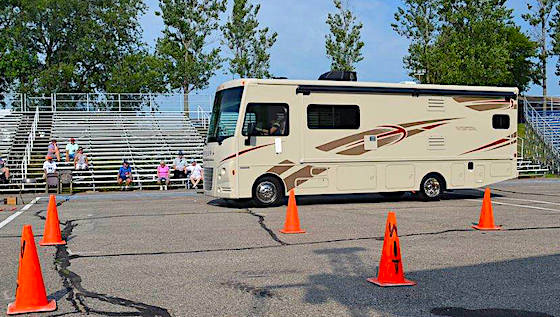
The key to RV driving safety deals with preparing for the road’s challenges. Take your new rig to a big parking lot and practice parking, backing up, and making tight turns. You can avoid some very costly RV beginner mistakes by taking the time to practice driving your rig.
Even veteran RVers take their new RVs out for a week or two on practice runs to relearn how to maneuver roadways. They need to find the pivot points when to start braking and other techniques. We highly recommend taking a video RV course to learn how to drive, maintain, winterize and care for your rig.
3. We Don’t Need No Stinking Apps!
Yes, you do. You’ll also need hard copy maps and books in case your electronics run out of power. Trip planners like RV Trip Wizard, campground review sites like The Dyrt, and RV life apps provide essential information, so you don’t end up on off-ramps that don’t have the services you need.
4. Checklists Make You Look Good
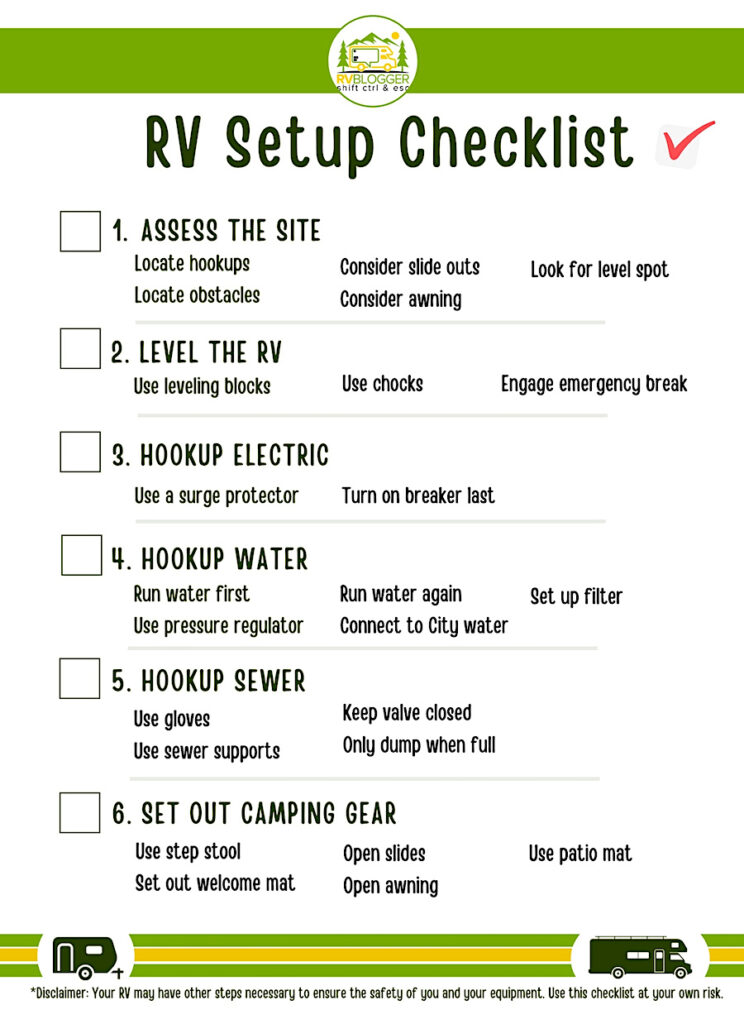
You know those moments where your partner or the kids get to say “I told you so”? Using an RV checklist before you leave is connected, prevents those situations…. makes sure you don’t forget anything. Do you want to spend your journey slowly boiling because you forgot to bring the water floating things?
5. Don’t Forget About our Good Friend Murphy
Murphy’s Law actually states (paraphrasing) to prepare for all contingencies. Have backup plans, emergency kits, and hard copies of necessary documentation in secured places in case you need them.
6. Protect Your Tow Vehicle
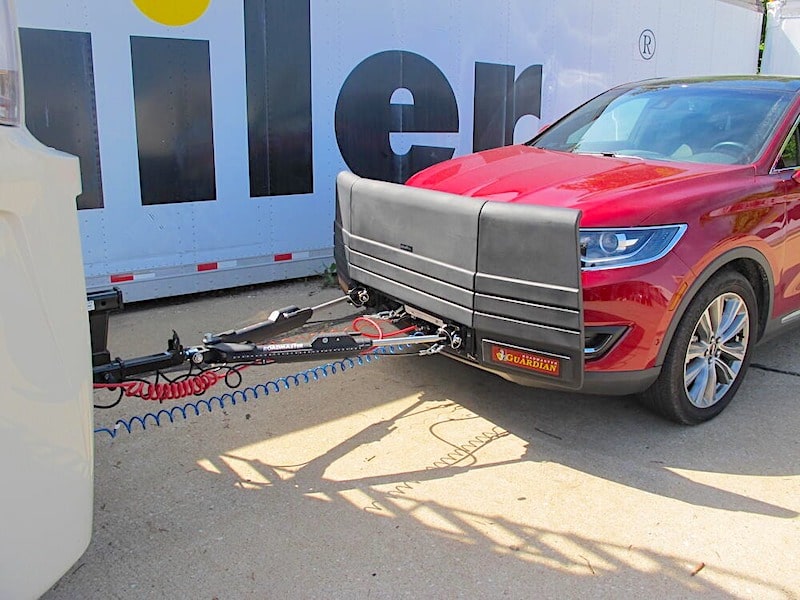
When you’re towing, many towing trailer tips involve keeping your vehicle protected. When you stop for the night, it’s a good idea to put your tongue jack down to relieve the weight from your truck’s suspension. The closer you are to your maximum tow capacity, the harder it’s on your vehicle. Look into online RV training courses for techniques from professional drivers.
7. When It Comes to Fuel, a Quarter Tank is Key
Always fill up your gas tank when it reaches a ¼ tank. You want to have enough reserve fuel in case you need to find a more RV-friendly gas station down the road or an emergency arises.
If you pay at the pump, don’t assume the auto-shutoff means your tank is full. Most gas stations have a maximum limit of $75- $125 cut-off. Motorhome RVers should go inside. The attendant can set the pump to stop when your tank is full.
8. Adjust Your Reality
Tunnels prohibit RVs from driving through due to the propane they carry. Underpasses not on highways might be too low, and you’re going to have many blind spots. Your cruising speed should be between 55-65 miles per hour. Remember, you’re not a stock car; you’re now a lot like an 18-wheeler.
To make toll roads simpler, you may want to invest in an electronic toll device like the RV TollPass. Tolls are generally going to be more expensive for you since your combined weight is heavier, and you have more than two axles. The RV TollPass works on 97% of all toll roads across the U.S., letting you use the cheaper and faster express lanes.
9. Sam Walton Isn’t as Inviting as He Used to Be
When Sam Walton created Walmart, one of his original policies allowed free camping in Walmart parking lots for one night. Unfortunately, times have changed. Many stores exist on properties they don’t own or in areas where the governing authorities don’t allow it.
Other big-box stores allow you to dry camp in their parking lots. There are various apps and websites out there that identify these places. You can also use Boondockers Welcome to find quiet locations all over the U.S. and Canada where fellow RVers host fellow campers at their homes.
10. Proper Waste Disposal Is a Big Deal
On your way to or from your vacation, you may need to empty your holding tanks or get rid of your trash. Disposing of the contents the wrong way can cost you dearly. Besides the negative environmental impact, the authorities can hit you with hefty fines.
Apps like Sanidump and RVdumps help you find safe and sanitary dump stations all across the country. Many are free dump stations or have nominal charges. A lot of them offer additional services like freshwater refills and other amenities.
11. Slow and Steady Wins the Race
A safe speed when towing a travel trailer is around 60 miles an hour. It balances distance and trailer control. Experienced RVers will follow the 2-2-2 rule (or 3-3-3) when RVing. They will travel no more than 200 miles, stop by 2 p.m., and stay no more than two nights.
Plans like this consider traffic, fuel refills, and other unexpected stops along the way. It gives you the best chance to get to your layover campsite before the office closes, and you’ll have plenty of daylight to set up. This method lets you enjoy the journey, and you won’t be exhausted when you reach your destination.
12. RV Beginner Mistake – Don’t Forget the Parking Brake!
In your zeal to get set up, you may find that you can’t extend the jacks or slideout on your motorhome. Before you start using harsh language or call your dealer’s technical support line, check the parking brake. Manufacturers have a safety feature where these two features won’t deploy until you engage the brake (don’t feel bad, even veterans forget).
13. Scout Your Ground
Before you pull in, take a few minutes to walk your campsite. You want to look for a few different things:
- Where the ground is the most level
- What hazards to avoid (trees, boulders, picnic tables, street lights, etc.)
- Where the utility hookups are
- Plan your RV positioning in relation to your neighbors
Check out our YouTube video on How to Set Up Your RV Campsite for Beginners for more tips.
14. We’re Level Enough
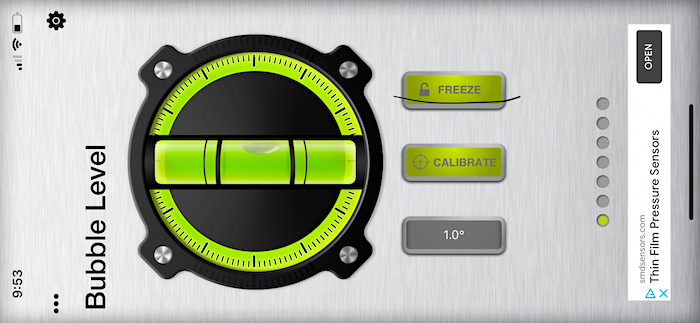
One of our RVBlogger friends has a great story about how his accountant father would have him adjusting the stabilizer jacks for an hour and a half while his Dad measured their RV with a carpenter’s level. Each time he tells it, the length of time gets a little longer, but he laughs about it now.
Being perfectly level is nearly impossible. You do want to keep your RV as level as possible. Your RV’s refrigerator and other components won’t operate efficiently if your unit is off too much. If your jacks don’t reach the ground, using RV leveling blocks made out of wood or plastic blocks under the stabilizer jacks work well.
15. Electric Adapts Down, Not Up
Most campgrounds have 50 amp, 30 amp, and 110v power outlets on their shore power stations. A few may not have 50 amp connections or, for some reason, don’t have 30 amp connections. In these scenarios, be careful how you hookup.
RV power adapters for 50 amp to 30 amp are okay to use, but 30 amp RVs SHOULD NOT connect to 50 amp power outlets. A 30 amp coach won’t be able to take on that much power. When you connect your 50 amp system to a 30 amp outlet, limit your power usage to avoid straining the power service.
16. Don’t Back In All By Yourself
Many drivers who have a lot of experience with their RVs have this ability. Yet they still use someone to guide them into position. Having that extra pair of eyes back there gives you the ability to position more accurately and see what’s in your blindspots and overhead. This is one of the easiest RV beginner mistakes to avoid.
17. Your RV Needs PPEs Too
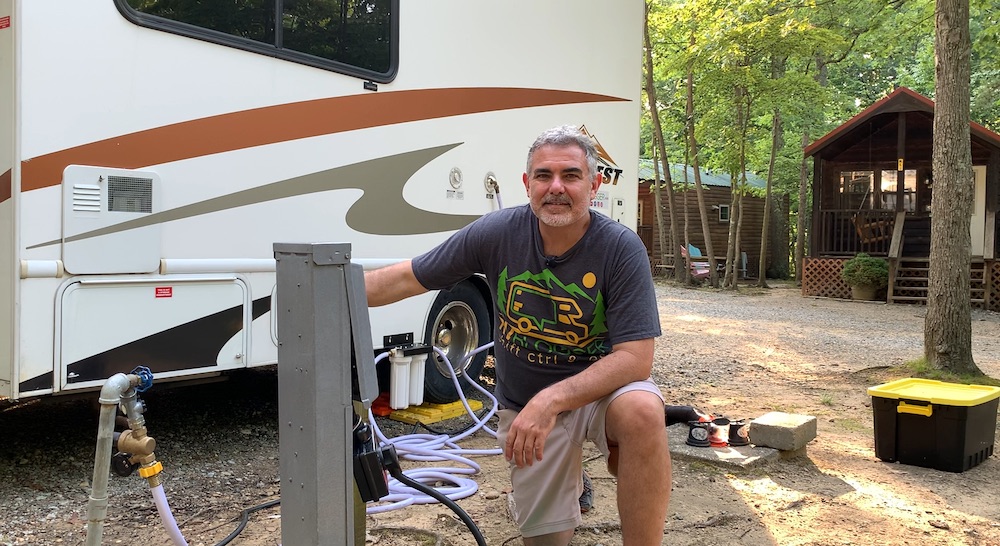
We’re not talking about front grill or tire covers; instead, we’re referring to your hookups. Surge protectors, water pressure regulators, and water filters are the best “personal protection equipment” your RV needs to protect the electrical and plumbing system. It keeps contaminants and insufficient electrical current from damaging your coach’s neural and arterial network.
18. RV Insulation Is Different
At the peak of summer or frigid nights, your RV’s insulation won’t maintain the inside temperature by itself. You’ll need to take extra steps to protect yourself from extreme temperatures. When you want some alone time, RV walls muffle sound, so be aware of the neighbors.
19. Don’t Cook Inside Your RV
When you cook inside your RV two things can happen that you might not like. First of all the cooking process creates humidity inside your RV and that can lead to mold issues. Second, the smell of the food you cook gets absorbed by the fabric inside your RV (dinette, bedding, mattress, window valences, etc.) causing it to retain cooking odors over time. Try your best to cook outside as often as possible.
Actually, there are many great recipes and videos on how to do it. We’re sure you don’t want to spend a day or two preparing non-holiday meals. Do some research on RV cooking. You’ll be amazed at how easy, delicious, and healthy they are.
20. Mind Your Fire
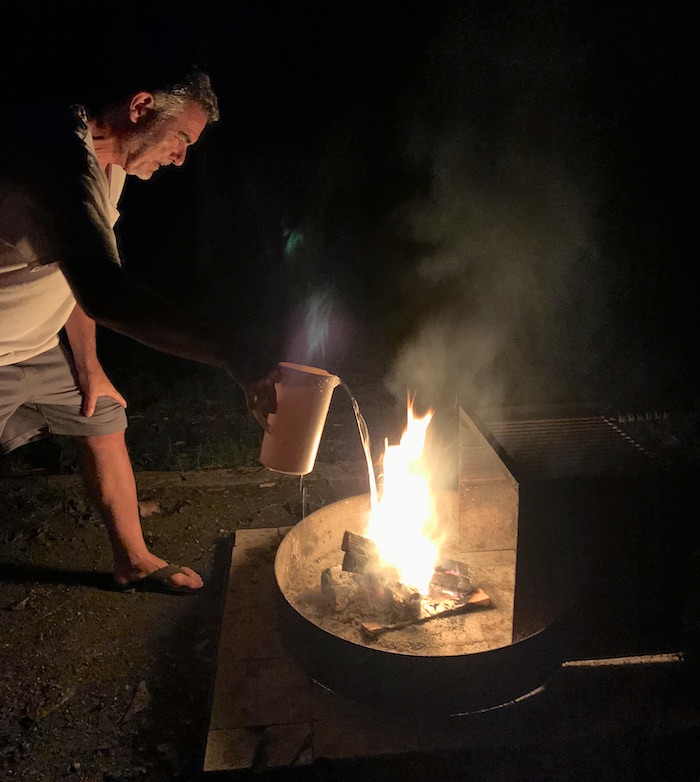
The quickest way to get kicked out of a campground is to leave your campfire unattended. To avoid the coals from relighting, make sure they’re no longer glowing. Keeping a five-gallon bucket in your RV to drench the fire is an excellent way to ensure the fire is entirely out.
21. The Campground’s Liability Stops at Your Campsite
If you look at the campground rules carefully, personal injury or property damage on your campsite falls on your shoulders. The owners are not trying to be mean. That’s how their insurance plans work.
That’s one of the many reasons why RV insurance is so important. If you end up in a situation like this, your RV plan covers you. For more information on RV insurance plans, you can read more on our feature article that discusses costs and the full spectrum of coverage it offers.
22. Be Prepared With Exit Strategies
Like the Djinni points out, in case of disaster, have an exit strategy and a rendezvous point for everyone to meet up. RV manufacturers do their best to make RVs fire-resistant, but things happen. You may also want to invest in an RV alarm system with multiple detection alarms to make you aware of the problem while still controllable.
23. Don’t Leave the Black Tank Valve Open
At the campground, you may have your sewer hose connected, but you don’t want to leave your black or grey tank valves open all the time. You’ll want to open the valves every 3-4 days, or right before you pack up.
Gravity is a funny thing. For your holding tanks to drain correctly, you need the waste to build up. The weight of the water creates a strong enough flow to reach the campsite’s sewer line. Leaving the valves open all the time will build up the waste in your tanks and hose because there’s not enough weight pushing the water through.
24. Packing Up Wet Leads to Mold and Mildew and Fungus
If you can avoid it, make sure your awning and soft-shell sidewalls are dry when you pack up. Leaving this cloth material enclosed under moist conditions allows corrosive molds and mildew to grow. Set your RV back up when you get home to dry everything out.
25. Use a Bin to Store Sewer Hoses
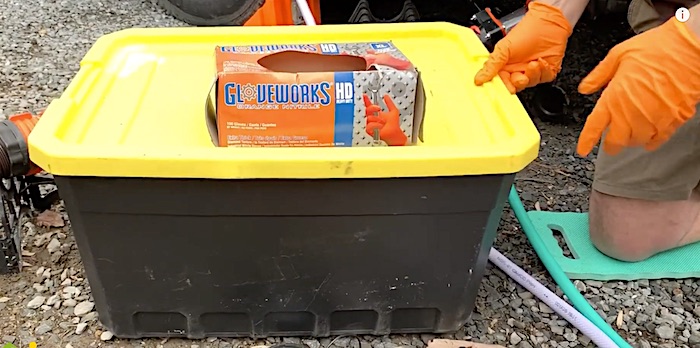
Try as you might, your water and sewer hoses won’t be completely dry when you pack up. Screwing your water hose ends together keeps the inside clean. Using a plastic bin and end caps will contain any leakage that spills out while you travel.
26. Rework Your Checklist
We’ve mentioned it before, but it’s so essential, an RV checklist can help you with your packing up process. Forgetting something at home is one thing; leaving something at the campground is a whole other headache that’s easy to avoid when you go over your checklist.
27. Give a Courtesy Goodbye
Whether you’re staying at a campground or boondocking with a host family, they always appreciate it when you let them know you’re leaving. Managers and owners can’t monitor the whole property, so let them know the campsite is ready for the next guest.
28. Pay it Forward With a Review
Did you choose this campground based on previous camper reviews? Almost all RVers, even before the internet, choose a campground based on previous experience, word of mouth, or peer review. Take a few minutes to write up a thoughtful review on a campground review site like The Dyrt or other peer review websites.
29. Debriefing Your Vacation
It’s a good idea to give yourself a day or two in between the day you get home and your first day back to your daily life. When you pull back into your driveway, you’re going to be tired. You’ll also need some time to unpack and recover from the drive.
You may want to start an RV living budget spreadsheet to go over your expenses during your vacation. As you continue to travel, a pattern will emerge for gas costs, food expenses, and other necessities. Soon you’ll be able to streamline those expenses, making your RV trips that much more cost-effective.
30. Our RV is Brand New – We Don’t Need Preventive Maintenance
If you think this is true, click here. Preventive maintenance includes monitoring your seals, washing the exterior, and other simple tasks. Starting your routine at the beginning of ownership will keep your investment in the best condition.
31. I Don’t Need to Winterize; It Doesn’t Get Cold Here
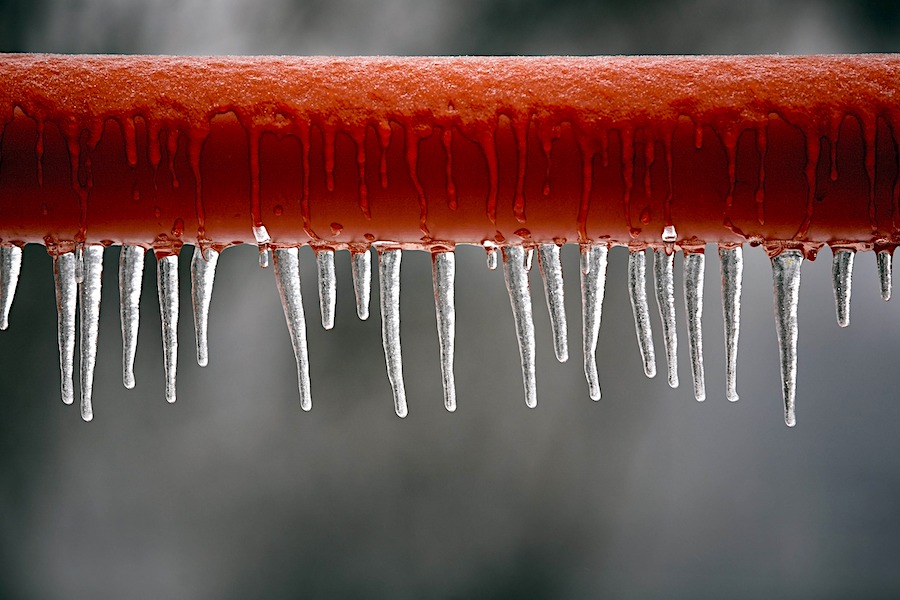
Using anti-freeze winterization fluid for your plumbing also protects it from drying out. If you’re going to store your RV for a while, you don’t want the piping to become brittle due to lack of use. Many coaches make the process simple due to advances in design in recent years. Read more about the advantages of winterizing your RV.
32. Where Are All the RV Storage Facilities?
There are many different levels of RV storage available. The most expensive places offer climate-controlled indoor RV storage with many features. Others have secure outside RV storage that may have covered stalls. Self-storage facilities in your local area have parking spaces for RV self-storage at reasonable prices.
33. Book Your Campsites Early
Susan and I use the off season to book most of our campgrounds for the following year. By the end of February, we typically have everything booked for the coming season.
If you’re not into winter camping, you can use these cold months to plan out your next season too. Work out when and where you want to go so you can get those reservations set early. Prices on equipment and new RVs are low if you need to update things.
34. Not Getting a Good Warranty
Repairs to RVs can be very costly so consider purchasing extended warranty coverage for your RV – even if it is brand new. But I don’t recommend you buy it from the dealer.
Dealer warranties are typically over priced and then they are financed with your RV so you pay interest on them on top of the high price. And dealer warranties typically have mileage caps. So you might have a 6 year policy that caps out at 60,000 miles – which for us means our coverage would end after 2 to 3 years.
A much better option is to use a company like Wholesale Warranties. We love our warranty with them because there is no mileage requirement, we can use RV repair facilities all across the US and we can even use a mobile mechanic who can come right to our campsite to make repairs. And the pricing is much lower.
35. Keep in Touch
We make friends at every campground. Every one of us is from somewhere. Stay connected with them through social media, email, or plain ole phone calls. You never know who’s going to be where at a particular time. Many of our RVBlogger friends meet each other and learn from one another on our Facebook page, RV Camping for Newbies.
RV Beginner Mistakes Are Great Stories
You may not appreciate it when it happens, but months from now, you’ll be sitting around a campfire, and the subject will turn to the funniest RV beginner mistakes people have done or heard. RVers and campers are storytellers by nature. You’re going to listen to some incredible tales, all of which are true, with some embellished polish.
Feel free to join in with some of your own. You’ll find that this is the least judgemental community on the planet. For every RV beginner mistake you’ve made, those listening have an equal (or worse mistake) they’re not telling. While these stories are funny, we also learn from them. As long as no one was hurt and it’s all in good fun, sit back and get ready to have a great evening.

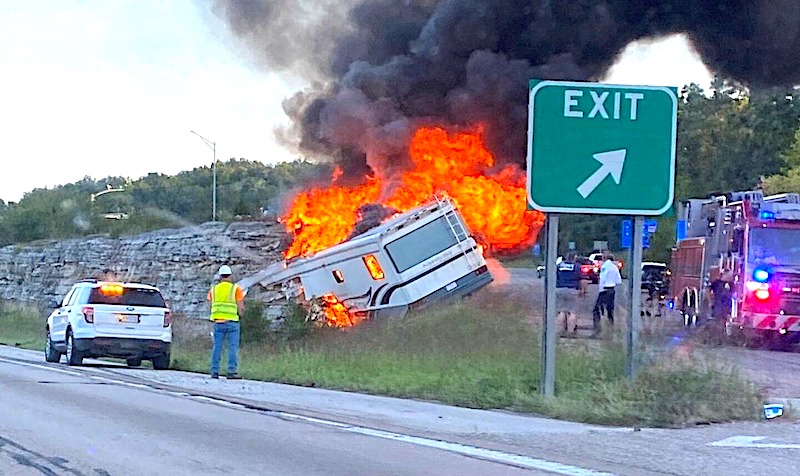
Yes, I would like to comment about Walmart.
Stay 80 yards from the back of the trailer. They maybe the safest drivers ever. They stay at or about 5mph below the speed limit. Which is perfect for us.
When you see his/her brakes tap, it’s a warning.
Sure I do buy stuff there but prefer a rest area or truck stop for sleep.
✔️
thank very much. this is all good information. I’m a beginner and I really appreciate the knowledge and experience you share.